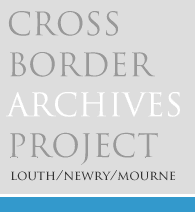Landowners of County Louth
The Foster Massereene Family
The origins of the Foster family in county Louth are obscure. Even the famous John (Speaker) Foster could trace the family back no further than his great-great grandfather Samuel Foster, whose name appeared in the Hearth Money return for Dunleer parish in 1666.
Given that the Fosters were a 'new' family, their estate was not acquired by patent or inheritance, but through a number of purchases until the estate had reached its maximum extent of c. 6,000 acres in the 1750s. Despite their relatively humble beginnings, the secret of their rise to prominence lay in their location at Dunleer, where they lived and held their land. Dunleer was a parliamentary borough, controlled by the Tenison family, who were also the Fosters' landlords. The Tenisons were negligent patrons, and the Fosters took advantage of this, eventually taking control of the return of one of the two parliamentary seats. Possession of this seat enabled Anthony Foster to be returned as an MP for Dunleer. His son John (later 'Speaker') Foster was returned from 1761 to 1768, The Fosters continued to return members of their family or their other connections until the borough was disfranchised by the Act of Union in 1801. John Foster enjoyed a particularly successful political career, serving as MP for county Louth from 1768 to 1821 (when he was elevated to the peerage as Baron Oriel), Chancellor of the Exchequer 1784-5, and Speaker of the House of Commons 1785-1800. After the abolition of the Irish parliament he twice served as Chancellor of the Irish Exchequer at Westminster, and then ended his career as Father of the House of Commons. John's son, Thomas Henry Foster married Harriet Skeffington, daughter of the 4th Earl Massereene. The death of the 4th Earl in 1816 without male issue allowed Harriet to succeed in her own right as Viscountess Massereene, and the Viscountcy, along with the substantial estate, descended through her.
The Foster estate was originally concentrated around Dunleer, however, the Fosters were able to take advantage of the ailing fortunes of the Moore family (a cadet branch of the Moores, Earls of Drogheda), whose large estate straddling counties Louth and Meath was in the process of being sold off in the first part of the 18th century. It is estimated that well over half of the Foster estate in Louth and Meath, which stood at 6,500 acres in 1778 and yielded a gross rental of £4,854, came from the Moore family as a whole.
Both Anthony Foster and his son John (Speaker) Foster were interested in improving their new estate. Anthony Foster invested in agricultural improvements, improving the drainage, fertility and general quality of the land. John Foster developed the linen industry in the area, building mills and encouraging Protestant weavers to settle in Collon.
However, despite the attempts to develop the prosperity of the Collon estate, its very acquisition had taken a heavy toll on the Fosters' finances. Much of the money raised for the purchase of the estate was borrowed, and by 1810 John (Speaker) Foster's debts were estimated at £72,000. The importance of the Collon estate to the Foster family declined in the 19th century. The huge debt created in the acquisition and running of the estate, coupled with the family's inter-marriage with the Skeffingtons, Earls and Viscounts Massereene, shifted the focus of attention away from the estates in Louth and Meath. The estate was eventually broken up under the Land Commission.
Sources
The Foster/Massereene papers are held in the Public Record Office for Northern Ireland, see www.proni.gov.uk. Click to view the PRONI introduction to the Foster/Massereene collection (pdf file)
- home |
- about project |
- online catalogue |
- online exhibitions |
- activities |
- oral history collection
- about us |
- contact us |
- legal |
- acknowledgements
© Cross Border Archives Project . Website design and development by morsolutions.
This project is part financed by the European Union through the Interreg IIIA Programme managed for the Special EU Programmes Body by the East Border Region Interreg IIIA Partnership.




